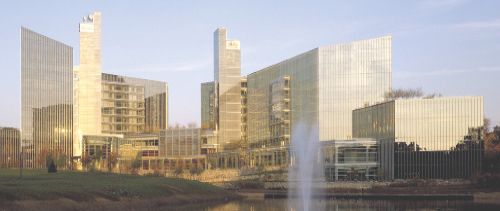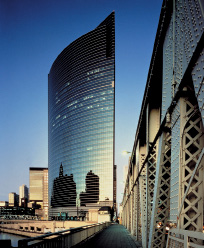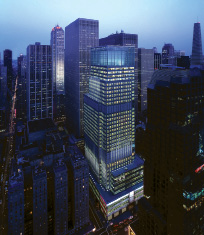


![]()
ONLINE

Editors' Note
On July 4th, 1976, along with William Pedersen and Sheldon Fox, Eugene Kohn founded Kohn Pedersen Fox Associates (KPF), a firm committed to providing design excellence for its clients and individual growth and leadership opportunities for its staff. Kohn served as President until becoming Chairman in 2003. He has lectured at numerous universities, organizations, and institutions around the world. In recognition of his accomplishments, he has been honored with many awards including the Lifetime Achievement Award given by the Wharton Real Estate Center (1997). He was recognized in 1998 with the Ellis Island Medal of Honor; in May of 2005, he was bestowed the Salvadori Award for Excellence in Design; and in May 2008, the Dean’s Medal from PennDesign (a seldom bestowed honor). He is an Executive Fellow of the Graduate School of Design at Harvard University, the first architect to be awarded the title, and he teaches at the Harvard Business School. He earned B.A. and M.A. degrees from the University of Pennsylvania. Kohn served in the U.S. Navy on Active Duty for three years between degrees, for five years on Reserve Duty, and retired as a Lieutenant Commander. He helped establish the Harvard International Real Estate Center and has also served as a Trustee for the University of Pennsylvania, is currently an Overseer for PennDesign, and is a founding member of the Wharton Real Estate Center Advisory Board. He is also a board member of the National Building Museum and Urban Land Institute.
Company Brief
Kohn Pedersen Fox Associates (www.kpf.com) is an international practice headquartered in New York, with offices in London, Shanghai, Hong Kong, Seoul, and Abu Dhabi. Its 500 staff members represent 43 countries and speak 30 languages. The firm provides architectural design, programming, urban design, master planning, interior design, and graphic design services for clients in both the public and private sectors. Their extensive portfolio, developed over more than 33 years, includes a wide range of projects, from civic and cultural spaces, to corporate headquarters and investment offices, hotel and residential towers, educational and laboratory facilities as well as hospitals, airports, and museums. The firm’s work has been widely exhibited, is the subject of 13 monographs, and has won over 300 awards.
My grip never needed to be tight – only inspirational, focused on building teamwork. We now have so many excellent partners (principals) that share leadership of the firm. But I’m still the Chairman, and recently took over our London office where we had a change in leadership after a handful of partners left following an unsuccessful buyout attempt. We currently have 18 partners (principals) globally.

USA Today headquarters
The key to the firm’s success is teamwork – it’s not about an individual. Bill Pedersen, Shelly Fox, and I, right from the beginning, decided to create a firm that would grow over the years and be able to exist after we moved on. The best thing we did was attract and train talented, bright, young architects and develop their professional and leadership skills. We wanted to establish a great firm that was an outstanding institution. Some of the partners that have risen to the top in leadership positions, while achieving excellent and professional results, are William Louie, Paul Katz (President), James Von Klemperer, and Jill Lerner, to name a few. Both Bill Pedersen and I are still very active, working full time. Bill continues to design some of his best buildings to date. The diversity of our staff, our work on different building types, and working across the globe has allowed our practice to improve due to the cultural diversity and talent of our staff. The firm’s exciting projects produce excellent career opportunities for our architects.
Our first client was the American Broadcasting Company in New York. In the ’70s, ABC was just becoming one of the three major networks along with CBS and NBC. Our early work for them provided excellent studios and work spaces to enhance their performance and led to 16 projects for ABC, as well as other significant projects around the country. The role of architecture isn’t just to create a great icon but, more importantly, to do an excellent job for the people who have to work, live, study, or get well in these structures. Buildings also need to be good neighbors within the already built and natural environments.
One of our earliest buildings that probably got the most reaction and publicity is 333 Wacker Drive in Chicago, on the bend of the Chicago River, in the Loop. At one million square feet, its shape and green glass reflects the bend and the color of the water, and the sky and surrounding environment. It is a dramatic building, and today it is loved and even more popular than when it was completed in the early ’80s. That put KPF on the map: it got national publicity and won many awards. 333 Wacker Drive launched us from doing low- to mid-rise buildings to tall buildings and urban buildings of importance. We also beat out some of the very best architects for projects like the Proctor & Gamble world headquarters in Cincinnati, Goldman Sachs in London, the DG Bank headquarters in Frankfurt, The World Bank in Washington D.C., the Federal Reserve Bank in Dallas, Morgan Stanley in New York, and the Ross School of Business in Michigan. These projects were key to giving the firm a great breadth of accomplished work, but also to moving us into areas we hadn’t been before.
Before we started working there, I thought it was going to be very difficult. It was a new experience. Working in China has been one of the most rewarding and exciting experiences. We’ve done the tallest building in China, the Shanghai World Financial Center for Mori Building of Japan. It is truly one of the most handsome towers in the world and received more press than any building we’ve done. The commission for SWFC came as a result of our design for Plaza 66, a mixed use development in Shanghai for Hong Kong developers called Hang Lung. These two projects led to KPF being commissioned for exciting projects in more than 16 Chinese cities of 3 to 5 to even 10 million square feet – staggering in size. We recently won the new airport for Nanning, China. Working in China is good for architects when it comes to completing projects in a relatively short period of time because of the ability of the government and the clients to determine what is best for their city and make it happen. We start a project and are confident it will be completed with the design being minimally compromised, if at all.

Shanghai World Financial Center
Our clients really care about quality. To work in an environment where you know if it is started, it’s going to get built, and that the client cares about the quality of its architecture, is good for architects, architecture, the city, and China.
Abu Dhabi and Qatar are still very good. Dubai has had its problems and it has been difficult for architects to currently work there because all the projects have stopped and the architects may or may not have been paid.
In Qatar, we’re doing a very tall building for the Finance Minister and a project called Aerospace, which is a mixed-use project. We’re also doing the headquarters for IBQ, which is the third largest bank in Qatar.
In Abu Dhabi, we’re doing the new airport, which will be built next to the existing airport. We’re just finishing the drawings but they’ve already started foundations – really a terrific project – a wonderful gateway to Abu Dhabi. In addition, we are doing the new media center for Abu Dhabi – also a gateway of sorts – and previously designed the headquarters for ADIA.

333 Wacker Drive, Chicago
It’s been my philosophy that the size of the project is not what is important – the clients are number one. So if there is a client we really respect and enjoy working with, it doesn’t matter whether they want to do their home or a $100-million project or a $2-billion project. The point is that you want to work with people who are good to work with, who care about what they are developing, and who are honorable and have great taste. So size doesn’t matter.
In addition to the quality of the client, the kind of project it is and the goals of the project are really most important. If, as a client, you’ve never done a building, like a house for example, an architect needs to know a lot about you, because he or she wants to design it specifically for you. You have to be willing to reveal your personality, your likes, your dislikes, your habits, and your quirks. But if it’s an office for you, it’s also about how you work. Architects should sit down with a client before they start and explain the whole process: what is going to take place each step of the way. A client has to be prepared emotionally and financially.
Because of the emphasis on celebrities in our society, the press only wants to talk about individuals, but with architecture, it is not accomplished by one person. There are great architects, you read their names, and the press give them all the credit, but the reality is, they may be the initial visionary, but without the rest of the architectural team, structural and mechanical engineers, other specialty consultants, contractors, tradesmen, and suppliers, and most of all, the client, these buildings cannot be realized.

Barclays, 745 Seventh Avenue, New York
Creating a building that never existed before from scratch, starting from a blank piece of paper, with no two buildings being exactly alike, is a significant challenge.
The process is normally a long one: two to ten or more years with, at times, bumps in the road. Issues range from the approval process with its potential delays, to the program and the function, to the solutions, to cost problems, construction delays, or just the fact the client does not fully see, or possibly understand, what the drawings and models attempt to communicate.
Having a team that is experienced and confident, and that communicates frequently, will give the client confidence, which will lead to success.
Costs are key. A lot of clients are naïve about construction costs, material costs, and escalation; they may fail to understand that world conditions, including interest rates, affect the costs of construction. It is about being clear and as accountable as possible with clients about costs, because no one can guarantee the costs with changing conditions.
Cost overruns can be due to client’s wishes that exceed the budget or to the architect’s exuberance or to contractor’s underestimate. In addition, no one can predict world conditions and the future of the economy, which can affect each phase of the project.
I should have – just kidding – but I haven’t. The Belgravia Gallery in London represents me and I’ve sold some paintings. But I don’t paint to sell; I just really enjoy it – it relaxes me. I keep many and give others to family and friends, as well as to charities. My mother was a great artist – she actually had a show at the Guggenheim at age 100. As an architect, we get buildings done relatively quickly in China, but it still can be five to nine years – I can do a watercolor in an hour or two. So I get total satisfaction in completing something in a short period of time, and when others enjoy them, it is very rewarding.
I love being with my family – my wife, Barbara and children are my biggest supporters – and painting, sports, and teaching. I most enjoy being active with people in a leadership and teaching role, inspiring and helping people to be successful. Almost as much as seeing a building finished, I enjoy seeing young architects maturing, growing, developing, becoming leaders, and accomplishing great things. To witness that is exciting for me.
To see the firm as strong and excellent as it is, with terrific spirit, with confidence for continued success in the future, with or without Bill Pedersen or myself, gives me a great sense of satisfaction – we have done our job well.•